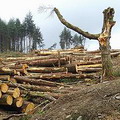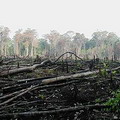 一項由聯合國執行針對地球森林進行的全球遙感探測調查(remote sensing survey),是為了進一步獲得對土地使用變化的知識,這些變化包括森林消失、森林復育(reforestation)及森林的自然拓展。
一項由聯合國執行針對地球森林進行的全球遙感探測調查(remote sensing survey),是為了進一步獲得對土地使用變化的知識,這些變化包括森林消失、森林復育(reforestation)及森林的自然拓展。
根據聯合國糧農組織(UN Food and Agriculture Organization,FAO)指出,這項評估將涵蓋地球土地整體表面積,包括9000個樣本,由聯合國糧農組織主導這個計畫。
身為這個調查協調者的聯合國糧農組織的林業助理常務主委海諾(Jan Heino)表示:「森林持續消失的情況,已經達到每年1300萬公頃的警戒速率。」森林每年流失的1300萬公頃面積(即13萬平方公里),相當於一整個希臘國土。
全球關切的問題不僅止於森林消失,還擴及森林蘊藏碳源的流失以及森林在氣候變遷上的角色,使得保護森林以及追蹤森林砍伐後碳排放狀況的監測行動越來越受重視。
海諾表示:「改善國家森林監測工作的需求已經勢不可檔,對於相關資訊的需求量也達到空前規模。國家政策流程也正努力應付一些像是減緩貧窮及糧食安全等與森林關係縱橫交錯的議題。」
聯合國糧農組織和他的伙伴們會將調查結果用在2010要出刊的下一版「全球森林資源評估(Global Forest Resources Assessment,FRA)」當中。這個全方位的全球森林狀態資料集是要用來強化所有國家監測他們所擁有森林的能力。
海諾表示:「將遙感探測科技與所蒐集的田野調查資料相結合,使我們得以改善兩種方法的品質,這會提供更正確的森林動向資訊以及森林砍伐與森林衰敗驅動因子的新資訊。」
聯合國糧農組織以176個國家組成的森林監測專家網絡來支援各國監測他們的森林,透過這個網絡進行資訊與經驗的分享。為了對付因氣候變化而越來越密集的森林火災,來自25個國家的許多氣象學家及火災科學家齊聚聯合國在加拿大舉辦的會議。
 7月14日開始於艾德蒙頓(Edmonton)舉辦的3天會議中,與會者將焦點聚集在改善火災危險指標及煙霧的預測與監測上。協助組織這次會議的聯合國世界氣象學組織(UN World Meteorological Organization)秘書長傑若德(Michel Jarraud)表示:「我們的目標是要在2009年做出火災氣象的農業氣象學操作指南。」
7月14日開始於艾德蒙頓(Edmonton)舉辦的3天會議中,與會者將焦點聚集在改善火災危險指標及煙霧的預測與監測上。協助組織這次會議的聯合國世界氣象學組織(UN World Meteorological Organization)秘書長傑若德(Michel Jarraud)表示:「我們的目標是要在2009年做出火災氣象的農業氣象學操作指南。」
森林火災的發展主要受氣象及氣候因子操控。長時間的低降雨量、低濕度及高氣溫就能使得植物增加可燃性。火災科學家們表示,僅僅在2008年的前7個月,美國就有118%平均10歲的森林區域遭燒毀,而其相鄰的加拿大約有83%平均10歲的森林遭祝融之災。
A global remote sensing survey of the Earth's forests is being conducted by the United Nations to enhance knowledge of land use change, including deforestation, reforestation and the natural expansion of forests.
The assessment will cover the whole land surface of the Earth with about 9,000 samples, according to the UN Food and Agriculture Organization, FAO, which will act as lead agency for the project.
"Deforestation continues at an alarming rate of about 13 million hectares annually at the global level," said Jan Heino, FAO assistant director-general for forestry, who will coordinate the survey.
That area of forest loss amounts to 50,193 square miles a year, an area roughly equivalent to the size of Greece.
Global concern has been growing over deforestation, loss of carbon stored in forests and the role of forests in climate change, giving rise to increased interest in monitoring to protect forests and to track emissions from deforestation.
"The need to improve national forest monitoring is overwhelming, as the demand for information has never been greater," Heino said. "National policy processes are striving to address cross-cutting issues such as poverty alleviation and food security related to forests."
The FAO and its partners will use the results of the survey in the next Global Forest Resources Assessment to be released in 2010.
This comprehensive data collection on the state of the world’s forests is intended to strengthen the capacity of all countries to monitor their own forests.
"By combining remote sensing technology with field data collection, we improve the quality of both methods," said Heino. "This provides more accurate information on forest trends and new information on the drivers of deforestation and forest degradation."
FAO supports countries to monitor their forests through a network of forest monitoring specialists in 176 countries who share information and experiences.
To address the intensified threat of forest fires posed by climate change, dozens of meteorologists and fire scientists from 25 countries have gathered at a UN-backed meeting in Canada.
Participants at the three-day meeting, which began Monday in Edmonton, focused on improving indices of fire danger and smoke forecasting and monitoring.
"Our target is to produce operational guidelines for fire weather agrometeorolgy by 2009," said Michel Jarraud, the secretary-general of the UN World Meteorological Organization, which helped to organize the event.
The development of forest fires depends largely on meteorological and climate factors. Lengthy periods of little rainfall, low humidity and high temperatures can lead to increased flammability of plants.
In the first seven months of 2008 alone, the fire scientists say, 118 percent of the 10-year average area has been burned in the United States, while 83 percent of the 10-year average has been burned in neighboring Canada.
全文及圖片詳見:ENS



